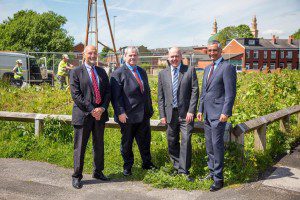
WITH fuel poverty being experienced by an estimated 14% of the UK households, a Scottish housebuilder is to build a brand new range of affordable, energy efficient homes, which have already attracted international attention, in Rochdale.
In partnership with Rochdale Council, specialist energy efficiency housebuilder AppleGreen is looking to introduce its first local development – “The Milnes” – located just a short distance from the town centre.
The new development will all be built to Code 5 from the Code for Sustainable Homes. Built to larger scale than would be expected by traditional developers, the new semi and terraced homes have the added bonus of the ability to convert attics for added bedroom or living space, allowing families to grow with their homes.
Launched in 2011, AppleGreen came to prominence two years ago, following the creation of its energy efficient home, specifically designed for the affordable sector of the market. Located on the BRE (Building Research Establishment) Innovation Park in Ravenscraig, Scotland, AppleGreen’s design has attracted international attention and the firm is now in talks with interested parties around the world. These include various organisations and governments in China, Malaysia, Middle East and Brazil, all of whom are seeking to address their own house building industries, by improving skills, creating jobs and ultimately building large volumes of quality, affordable, energy efficient homes.
Alan Wallace, founder of AppleGreen said, “Our goal has always been to design and build better, bigger, warmer homes for a very affordable price, allowing the average family not just the chance to finally afford a home but also meet the fuel bills. It took two years of intensive research and development, working with experts from BRE as well as universities and architects, to develop a blueprint to meet the rigorous standards required to build on the BRE Innovation Park in Scotland. Our build is a hybrid system, partially built in a factory for improved quality, reduced waste and reduced time. We then construct on-site which is much quicker than traditional builds, and we incorporate various energy creating and energy efficient products. We believe this combination of future build technologies, creating energy with the solar panels and heat recovery, energy saving products will vastly reduce energy costs, helping to eradicate fuel poverty.”
To support The Milnes development, which it hopes will be the first of many in the area, AppleGreen intends in the future to build a factory in the area, employing local people and improving skills, which in turn will assist in pouring millions of pounds into the local economy.
Rufus Logan, Director with BRE added, “Rochdale Council is to be applauded for its forward thinking policy in relation to housebuilding, especially at a time when many appear to be moving away from the Code for Sustainable Homes requirement. AppleGreen continues to plan and design to this exacting standard, allowing them to take advantage of advances in construction technologies faster and more consequentially. Benefits brought by the Code for Sustainable Homes have improved sustainability and energy efficiency in new builds and whilst many argue that they cannot afford to build this type of housing, I believe AppleGreen and Rochdale Council will prove otherwise.”








